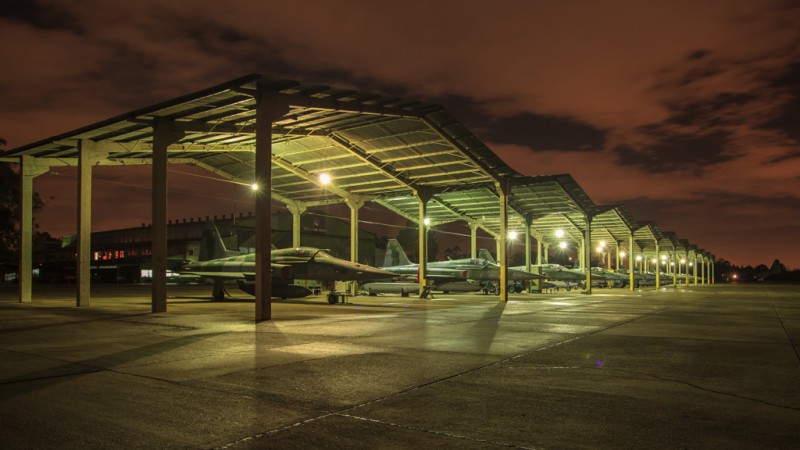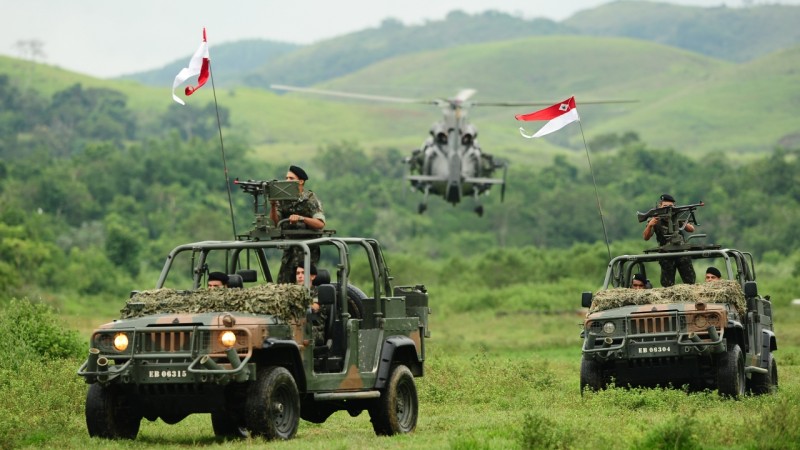Defense, Security and Aerospace
Rio Grande do Sul has one of Brazil’s largest technology and industrial centers for defense and security products and services, with skilled human resources and a large concentration of military personnel. Highly competitive, innovative and diversified, the center is supported by a strong supply chain and exporting tradition.
Rio Grande do Sul has one of the greatest concentrations of military personnel of Brazil’s Armed Forces. The headquarters of the 5th Naval District of Brazil’s Navy is located in the southern city of Rio Grande. One of its responsibilities is to conduct naval and land operations, as well as to provide support to naval, air and marine forces.
Porto Alegre, the state capital, hosts the Southern Military Command (Comando Militar do Sul) of the Brazilian Army, whose function is to safeguard the territorial sovereignty in the Southern Region of Brazil. For this purpose, the Command has 50 thousand military personnel (25% of the total military personnel of the Brazilian Army) and 75% of the mechanized ground force.
 ALA 3 is headquartered in Canoas, in the Metropolitan Region of Porto Alegre. It is the military organization that represents the Brazilian Air Force (FAB) in the southern states of Paraná, Santa Catarina and Rio Grande do Sul. The organization performs administrative functions of support to operational units and coordinates the institutional relationships with the community and with agencies of the Executive, Legislative and Judicial branches of the government. The southern Brazilian states host more than 30 air force units, considering air bases, flight squadrons, infantry battalions, units responsible for air space control and communications, as well as air force installations.
ALA 3 is headquartered in Canoas, in the Metropolitan Region of Porto Alegre. It is the military organization that represents the Brazilian Air Force (FAB) in the southern states of Paraná, Santa Catarina and Rio Grande do Sul. The organization performs administrative functions of support to operational units and coordinates the institutional relationships with the community and with agencies of the Executive, Legislative and Judicial branches of the government. The southern Brazilian states host more than 30 air force units, considering air bases, flight squadrons, infantry battalions, units responsible for air space control and communications, as well as air force installations.
The Defense Industry of Rio Grande do Sul is very diversified and participates in different strategic projects of the Armed Forces. Rio Grande do Sul is the 3rd largest Brazilian state in revenues and number of companies in the segment, according to a study requested by the Brazilian Defense and Security Industry Association (Abimde) in 2014. Moreover, the Southern Region ranks second in Brazil in the number of jobs generated by the sector (Fipe, 2014). The companies are mostly active in the following segments:
 Development of systems and simulators
Development of systems and simulators- Maintenance, repair, adaptation and modernization of vehicles for the sector
- Avionics
- Light weapons
- Telecommunications
- Cyber defense
- Microcontrollers
- Remotely piloted aircraft
- Experimental aircraft
Some leading companies of Rio Grande do Sul supply defense products to the Armed Forces, such as the Strategic Defense Company Taurus (light weapons), Axur Security and Cyber Defense Ltd. (cyber defense) and Agrale (military utilities). Besides, AEL Sistemas S.A. is Brazil’s largest supplier of avionics equipment to the Brazilian Air Force (FAB), integrating the Gripen fighter jets project, responsible for the Wide Area Display (WAD), the Head-Up Display (HUD) and the Helmet Mounted Display (HMD). In turn, KMW Brasil is responsible for the maintenance and modernization of Leopard and Gepard armored vehicles purchased by the Brazilian Army.
In view of this scenario, the State Government increasingly recognizes the importance of the Defense and Security sector as an inducer of Rio Grande do Sul's economic and technological development. Therefore, since 2015, besides being listed as strategic in the development, the sector also receives preferential treatment under the Local Productive Arrangements Program (APLs) and the Science and Technology public notices.
 The strong military vocation of the Central Region of Rio Grande do Sul and the need to promote this potential and stimulate the regional development led to the creation of APL Polo de Defesa e Segurança de Santa Maria (Santa Maria Defense and Security Cluster). The Cluster gathers businessmen of the sector, representatives of the Navy, Army and Air Force, as well as teaching and research institutions, government and strategic agencies, with the main purpose of ensuring that civil and military leaders work in partnership in the Defense and Security sector, in addition to promoting access of cluster companies to the market. Moreover, the Defense Center of Santa Maria, Rio Grande do Sul counts on two other centers whose actions are supported by the State Government, namely the defense center of Serra region, headed by the Chamber of Industry and Commerce of Caxias do Sul (CIC) of Caxias do Sul, and the Defense Center of the Metropolitan region, coordinated by the Defense and Security Industry Committee of the Federation of Industries of Rio Grande do Sul – (Comdefesa/FIERGS)
The strong military vocation of the Central Region of Rio Grande do Sul and the need to promote this potential and stimulate the regional development led to the creation of APL Polo de Defesa e Segurança de Santa Maria (Santa Maria Defense and Security Cluster). The Cluster gathers businessmen of the sector, representatives of the Navy, Army and Air Force, as well as teaching and research institutions, government and strategic agencies, with the main purpose of ensuring that civil and military leaders work in partnership in the Defense and Security sector, in addition to promoting access of cluster companies to the market. Moreover, the Defense Center of Santa Maria, Rio Grande do Sul counts on two other centers whose actions are supported by the State Government, namely the defense center of Serra region, headed by the Chamber of Industry and Commerce of Caxias do Sul (CIC) of Caxias do Sul, and the Defense Center of the Metropolitan region, coordinated by the Defense and Security Industry Committee of the Federation of Industries of Rio Grande do Sul – (Comdefesa/FIERGS)
The State counts on a broad network of technical teaching and higher education institutions. The Federal University of Santa Maria (UFSM) is a national reference in defense issues. In addition to being the only university of Rio Grande do Sul that signed a Memorandum of Understanding with the Brazilian Army, it launched the first undergraduate course in Aerospace Engineering in the state, in 2014 – the sixth in the country. The undergraduate course in Acoustical Engineering of UFSM, in turn, signed a protocol of intentions with the Brazilian Navy, in 2015, for the establishment of partnerships in teaching, research and development projects
The Technological Park of Santa Maria (Tecnoparque de Santa Maria) was recognized by the Brazilian Association of the Industries of Defense Materials and Security (Abimde) as one of Brazil’s three technology parks focused on Defense and Aerospace. In July 2016, a Memorandum of Understanding was signed between the Department of Science and Technology (DCT) of the Brazilian Army and the Technological Park of Santa Maria aimed to promote the exchange of technical and human resources, so that the companies associated to the park can meet the demands of science, technology and innovation of the Brazilian Army.
The InvestRS team works in connection with Comdefesa/ Fiergs and the main regional representatives of the segment, such as the Development Agency of Santa Maria (ADESM) and the Chamber of Industry and Commerce of Caxias do Sul (CIC). Thanks to this synergy, the State’s defense industry is promoted in events and fairs targeted to Brazilian civil and military officials.
Sector opportunities in Rio Grande do Sul
- The segment of simulation in Rio Grande do Sul is very promising. The Brazilian Army established the Simulator of Fire Support (Simaf) in the city of Santa Maria, at the Training and Evaluation Center-South (CAA-Sul). Thus, Santa Maria has become the capital of live, virtual and constructive simulation for the Brazilian Army. The opportunities are both for large companies that provide complete simulation systems and for small and medium companies that can establish themselves at the Technological Park of Santa Maria, which has a shared infrastructure of equipment and software for the development of simulators.
 Defense and cybersecurity have been growing considerably in Brazil. Currently, the country loses over $8 billion a year to internet crimes. According to the survey, the Latin American cybersecurity market is expected to grow from US$ 5.29 billion in 2014 to US$ 11.91 billion in 2019. The Brazilian digital security market alone is expected to reach US$ 7.29 billion in the same period1. One of the main Brazilian companies in this segment, Axur, is based in Porto Alegre, attesting to the prominence of the segment in Rio Grande do Sul.
Defense and cybersecurity have been growing considerably in Brazil. Currently, the country loses over $8 billion a year to internet crimes. According to the survey, the Latin American cybersecurity market is expected to grow from US$ 5.29 billion in 2014 to US$ 11.91 billion in 2019. The Brazilian digital security market alone is expected to reach US$ 7.29 billion in the same period1. One of the main Brazilian companies in this segment, Axur, is based in Porto Alegre, attesting to the prominence of the segment in Rio Grande do Sul. The segment of Remotely Piloted Aircraft (RPA) is expanding fast in Brazil. In 2017, the National Civil Aviation Agency (Anac) approved the Brazilian Regulation of Special Civil Aviation, which regulates the operation of RPAs. This regulation is expected to provide the legal certainty needed to ensure the expansion of RPAs for use in crop spraying and public and private security. Rio Grande do Sul’s environment favor the development of companies of this segment, due to the robust electric-electronic chain established in the state, as well as to the potential market, especially in agribusiness. The success of local companies such as Skydrones – that manufactures drones for defense, public safety, inspection and agriculture – demonstrates the potential of Rio Grande do Sul.
The segment of Remotely Piloted Aircraft (RPA) is expanding fast in Brazil. In 2017, the National Civil Aviation Agency (Anac) approved the Brazilian Regulation of Special Civil Aviation, which regulates the operation of RPAs. This regulation is expected to provide the legal certainty needed to ensure the expansion of RPAs for use in crop spraying and public and private security. Rio Grande do Sul’s environment favor the development of companies of this segment, due to the robust electric-electronic chain established in the state, as well as to the potential market, especially in agribusiness. The success of local companies such as Skydrones – that manufactures drones for defense, public safety, inspection and agriculture – demonstrates the potential of Rio Grande do Sul.- Recognized as the national capital of armored security vehicles, Santa Maria also hosts General Walter Pires Armored Training Center, a reference in the specialization of military personnel of the Armed Forces and Friendly Nations in the operation of armored and mechanized warfare and of tactical use of these vehicles at subunit level. In addition to the demand for simulators, there are more than 250 armored fighting vehicles that require modernization and nationalization of parts, systems and components.
- The demand for systems, video-monitoring technologies and adapted vehicles is increasing in the public security segment. Investing in this sector is one of the priorities of the government of Rio Grande do Sul.
Business opportunities for partnerships
Look for local opportunities.
